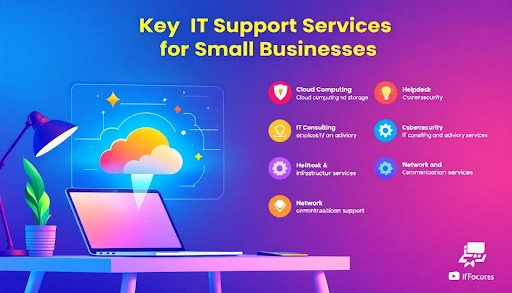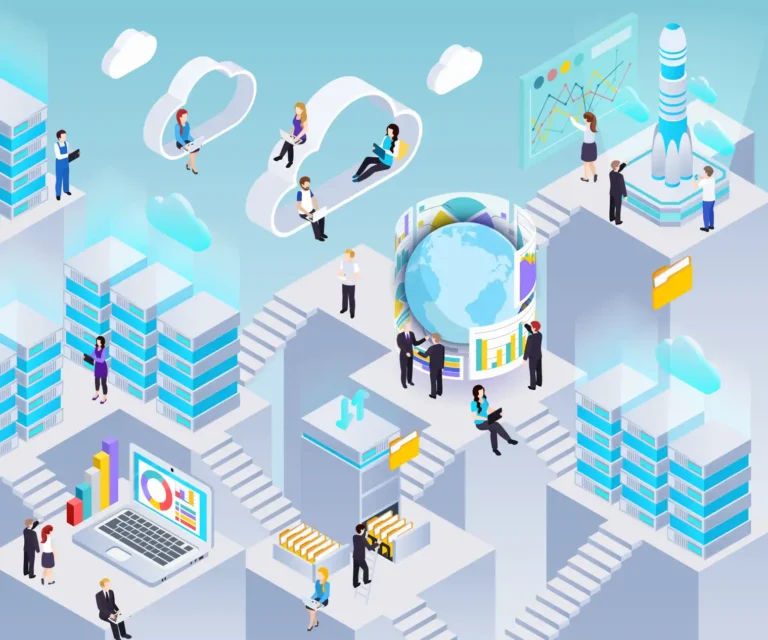Top Benefits of IT Support for Small Business
IT support for small business is essential for resolving tech issues quickly, enhancing security, and optimizing resources. In this 1article, we explore key benefits and services of IT support for small business to help small businesses thrive.
Key Takeaways
- Effective IT support is crucial for small businesses, enhancing productivity, security, and operational continuity through proactive management of technology-related challenges.
- Choosing between in-house and outsourced IT support involves weighing control and customization against cost efficiency and access to diverse expertise.
- Implementing managed IT services allows small businesses to focus on core operations while benefiting from comprehensive IT management, including cybersecurity, disaster recovery, and mobile device management.
Understanding IT Support for Small Businesses
IT support refers to the assistance provided for technology-related challenges faced by businesses, ensuring the smooth operation of their IT infrastructure. For small businesses, effective IT support is indispensable as it enhances productivity by efficiently managing and resolving IT issues. From troubleshooting technical problems to optimizing network performance, IT support encompasses a variety of functions that are crucial for maintaining business continuity and operational oversight.
A centralized platform is essential in managing IT operations and enhancing security. Such platforms streamline processes, reduce vulnerabilities to cyber threats, and improve overall efficiency by providing a unified solution for addressing IT requests and incidents.
Moreover, small businesses benefit from IT support through improved security measures and streamlined management of IT assets, contributing to a successful business. In an era where cyber threats are ever-present, having a dedicated IT department and support team to safeguard sensitive data and ensure compliance with data protection regulations is vital.
The benefits of IT support extend beyond mere problem-solving; it also includes proactive measures to prevent disruptions and maintain a secure, efficient IT environment.
Key IT Support Services for Small Businesses

The spectrum of IT support services available to small businesses is vast, covering everything from technical support to network services and cybersecurity solutions. Each service plays a pivotal role in ensuring the seamless functioning of a business’s IT infrastructure, addressing both immediate technical issues and long-term strategic goals.
Effective service delivery is crucial in IT support services, as it ensures the availability and performance of IT services through resolving technical issues, ongoing maintenance, user training, and optimizing IT processes to align with business objectives.
Here, we explore the key services that every small business should consider to fortify its IT framework.
Technical Support
Tech support is the frontline support of IT services, where technical support professionals assist in resolving hardware or software issues, network configurations, and system integrations. This support model follows a tiered system, allowing businesses to receive appropriate assistance based on the complexity of their issues. For example, Level 1 support might handle basic troubleshooting, while more complex issues are escalated to higher tiers.
Customers should have access to real-time online status updates for ongoing service requests directly, ensuring transparency and efficiency. This not only helps in addressing immediate technical issues but also fosters customer satisfaction by keeping users informed throughout the resolution process with rapid support and remote support.
Technical support professionals step in to provide the necessary specialized expertise, providing technical support as a support specialist to ensure that technical problems do not hinder business operations for service desk professionals, fulfilling a vital support function.
Network Services
Effective network services are crucial for managing network configurations and ensuring optimal performance. IT support technicians analyze and troubleshoot network issues, provide help to non-IT users, and ensure cybersecurity. Technicians possess specialized knowledge necessary for troubleshooting and managing network services.
Optimizing network services helps businesses maintain a robust IT environment, supporting critical systems and network systems operations, which enhances overall productivity and security.
Cybersecurity Solutions
In today’s digital landscape, small businesses are increasingly vulnerable to cyber threats. Robust cybersecurity measures are essential, including system updates and employee training. These measures help safeguard critical systems and sensitive data, providing immediate solutions to potential security breaches and ensuring business continuity.
Investing in small business cybersecurity solutions not only protects against external threats but also enhances the overall resilience of a business’s IT infrastructure. Regular software investment and employee education on best practices significantly reduce the risk of cyberattacks, helping small businesses maintain a secure operational environment.
IT Infrastructure Management
IT infrastructure management is a critical component of IT support, involving the administration and maintenance of an organization’s computer systems, networks, and other technology infrastructure. Effective IT infrastructure management ensures that all systems are running smoothly, efficiently, and securely, allowing businesses to operate without interruption. This includes tasks such as managing network configurations, addressing system integrations, and ensuring data backup and disaster recovery plans are in place. IT infrastructure management is typically handled by a dedicated team of IT professionals who possess specialized knowledge and technical expertise.
By effectively managing network configurations, IT professionals can optimize performance and prevent potential issues before they arise. Addressing system integrations ensures that different software and hardware components work seamlessly together, enhancing overall efficiency. Additionally, having robust data backup and disaster recovery plans in place is essential for protecting against data loss and ensuring business continuity in the event of a disaster. The specialized knowledge and technical expertise of IT professionals are invaluable in maintaining a secure and efficient IT infrastructure.
Levels of IT Support

The tiered support system is designed to handle various levels of technical issues efficiently. Tier 0 support allows users to solve issues independently using self-service resources. When basic troubleshooting is insufficient, Tier 1 support involves direct interaction with user support to resolve more straightforward problems.
It is important to note that technical support is distinct from both the help desk and service desk, as it requires specialized expertise to resolve complex issues beyond initial troubleshooting.
If the issue remains unresolved, it is escalated to Tier 2, where staff with advanced technical skills address more complex problems, addressing advanced challenges. Tier 3 support focuses on resolving intricate technical matters that elude lower tiers and may require expert intervention, including intricate technical challenges. Finally, Tier 4 support is sourced from external vendors or specialists when in-house resources are insufficient, troubleshooting database issues. Second line support tier is essential for managing these escalations effectively.
This structured approach ensures that each level of support is equipped to handle specific issues through multiple support channels, improving efficiency and user satisfaction.
In-House vs. Outsourced IT Support
Deciding between in-house and outsourced IT support is a critical decision for any small business. In-house IT teams have direct control over operations, which allows for tailored solutions to specific business needs and quicker issue resolution. Streamlined communication protocols within the company further enhance collaboration and efficiency. However, maintaining an in-house IT team can be costly, as it involves salaries, infrastructure, and ongoing training.
On the other hand, outsourcing IT support can convert fixed costs into variable costs, making it easier to manage budgets. Outsourced support services offer access to a broader range of expertise, covering various IT domains like cybersecurity and cloud technologies. This enables businesses to focus on core competencies while delegating IT tasks to external professionals. However, communication challenges and potential security concerns must be considered when outsourcing.
Ultimately, the choice between in-house and outsourced IT support depends on the specific needs and resources of the business. Managed IT services, for instance, allow small businesses to outsource their IT operations to specialists, improving access to IT expertise and reducing the time business owners spend on IT-related issues.
Building an Effective IT Support Team
Building an effective IT support team, including skilled support specialists who provide essential technical assistance, is vital for ensuring that a business’s technology-related issues are handled efficiently. This process involves identifying the necessary skillsets, hiring the right talent, and providing ongoing training and development. A well-rounded support team can address both immediate technical problems and long-term strategic goals, contributing to the overall success of the business.
Skill sets Required for IT Support Professionals
Essential skills for
IT support professionals include:
- Technical expertise
- Communication skills
- Problem-solving abilities
- Attention to detail
- Writing skills
- Empathy
- The ability to quickly learn new technologies
Collaboration tools play a crucial role in enhancing IT support by enabling seamless communication and coordination among various departments.
When recruiting for IT support roles, it is crucial to prioritize candidates who can articulate technical concepts clearly to computer users and demonstrate strong problem-solving capabilities.
Empathy is an essential trait in IT support personnel, as it helps them understand and resolve user issues more effectively. Focusing on these skills and traits allows businesses to build a reliable IT support team that can effectively address both technical issues and customer needs.
Hiring the Right Talent
When hiring for IT support, prioritizing technical expertise and communication skills ensures responsiveness and effectiveness. Attention to detail is vital as IT support often involves precise configurations and record-keeping. These skills and traits contribute significantly to building a reliable and effective IT support team capable of addressing both technical issues and customer needs.
Hiring the right talent for your IT support team is crucial for ensuring effective technical assistance and customer service. By focusing on candidates with the right blend of skills and experience, businesses can create a support team that enhances operational efficiency and customer satisfaction.
Training and Development
Offering ongoing training is crucial to ensure IT support staff stay updated with the latest technology and support practices. Continuous professional development helps keep IT support staff updated on the latest technologies, ensuring they are equipped to handle advanced challenges.
Regular assessments can help identify training needs and ensure that staff are equipped with up-to-date skills. By investing in training and development, businesses can maintain a highly skilled IT support team that contributes to the overall success of the organization.
Managed IT Services for Small Businesses
Managed IT services refer to IT functions that are outsourced to service providers, providing comprehensive support for small business operations. Proactive monitoring systems are essential as they enable identification of potential IT issues before they lead to downtime. Regular software updates and patches are crucial for maintaining system efficiency and preventing disruptions.
Managed IT services also align technology strategies with the organization’s strategic goals, ensuring that IT initiatives contribute to broader organizational objectives.
Establishing partnerships with a managed service provider (MSP) can significantly enhance a company’s ability to manage cybersecurity risks effectively. MSPs align technology strategies with business growth objectives, ensuring that IT initiatives support overall business goals.
Delegating IT management to professionals allows business owners to concentrate on growth and development, which improves overall productivity and job satisfaction.
Enhancing Productivity Through IT Support

Small businesses often face significant downtime due to technical issues, impacting customer satisfaction and revenue. According to Gartner, the average cost of downtime per minute is $5,600, which emphasizes the importance of minimizing interruptions. IT support services help in optimizing operations and enhancing productivity by addressing these issues promptly.
A strategic IT plan helps small businesses enhance operations and minimize IT emergencies through strategic planning. Managed IT services can improve employee productivity by ensuring that technology is up-to-date and functioning optimally.
Additionally, a comprehensive disaster recovery plan is essential for minimizing business interruptions caused by unexpected disasters. Regular testing of these plans ensures effectiveness and readiness for real-life events.
Data Backup and Disaster Recovery
Disaster recovery and backup plans are vital to ensure continuous operations within a business. Preparation for data loss provides small businesses with a competitive advantage by minimizing interruptions. Effective disaster recovery strategies support business resilience, helping organizations recover operations without data loss. The first step in creating a disaster recovery plan is an initial assessment of the current backup system.
Only 32% of small businesses have a written disaster recovery plan, highlighting the importance of documentation. A key aspect of a disaster recovery plan is that it should be documented and regularly tested.
Effective measures for configuring IT infrastructure for disaster recovery include redundant internet, backup services, and cloud recovery options. Compliance with data privacy standards often necessitates having a disaster recovery strategy in place.
Mobile Device Management
Mobile Device Management (MDM) helps companies with deploying, tracking, and protecting mobile devices. Mobile devices are increasingly targeted in cybersecurity due to more business processes and payment options migrating to mobile. MDM enhances business security by enabling remote locking and wiping of devices that are lost or stolen.
Additionally, MDM solutions allow IT teams to enforce encryption policies to safeguard sensitive data on mobile devices and provide real-time compliance monitoring to prevent unauthorized access to corporate data. MDM also allows organizations to control application usage by whitelisting or blacklisting apps on mobile devices.
Service Desk
A service desk is a centralized point of contact between an organization’s IT department and its employees, customers, or end-users. The primary function of a service desk is to provide technical support and assistance with hardware or software issues, as well as address other technology-related problems. Service desk professionals are responsible for managing service requests, resolving immediate technical issues, and escalating complex problems to higher-level support teams. A well-functioning service desk is essential for ensuring customer satisfaction, reducing downtime, and improving overall business operations.
Service desk professionals play a crucial role in maintaining smooth business operations by providing timely and effective technical support. They handle a wide range of service requests, from simple password resets to more complex hardware or software issues. By resolving immediate technical issues promptly, they help minimize downtime and ensure that employees can continue their work without significant interruptions. When faced with more complex problems, service desk professionals escalate these issues to higher-level support teams, ensuring that they are addressed by experts with the necessary technical knowledge. This structured approach to technical support helps maintain high levels of customer satisfaction and operational efficiency.
Small Business IT Support Challenges
Small businesses often face unique IT support challenges, including limited budgets, scarce technical resources, and the need to balance multiple responsibilities. One of the main challenges is finding a reliable and affordable IT support model that meets their specific needs. Small businesses must also contend with cybersecurity threats, data backup and recovery, and ensuring business continuity in the event of a disaster. Additionally, small businesses may struggle to keep up with the latest technology trends and innovations, making it difficult to stay competitive. Outsourcing IT support to a managed service provider can be an effective solution for small businesses, providing access to specialized expertise and resources.
Managed service providers offer a range of services that can help small businesses overcome these challenges. By outsourcing IT support, small businesses can benefit from the specialized expertise of IT professionals who are well-versed in the latest technology trends and best practices. This allows small businesses to focus on their core operations while ensuring that their IT infrastructure is managed effectively. Additionally, managed service providers can offer scalable solutions that grow with the business, providing the flexibility needed to adapt to changing needs and demands. This approach not only enhances business continuity but also helps small businesses stay competitive in a rapidly evolving digital landscape.
IT Support Cost
The cost of IT support can vary widely depending on the size and complexity of an organization’s IT infrastructure, as well as the level of technical expertise required. Factors such as the number of users, devices, and systems, as well as the frequency and severity of technical issues, can all impact the overall cost of IT support. On average, the cost of IT support can range from a few hundred to several thousand dollars per month, depending on the specific services and support model chosen. It’s essential for businesses to carefully evaluate their IT support needs and budget to ensure they are getting the best value for their investment.
When evaluating IT support costs, businesses should consider the potential return on investment. Effective IT support can lead to increased productivity, reduced downtime, and enhanced security, all of which contribute to the overall success of the business. By investing in the right IT support solutions, businesses can ensure that their technology infrastructure supports their operational goals and growth objectives. Additionally, businesses should look for IT support providers that offer flexible pricing models and scalable solutions, allowing them to adjust their IT support services as their needs evolve. This approach helps businesses manage their IT support costs effectively while ensuring they receive the necessary technical expertise and support.
Choosing the Right IT Support Solution
Skilled IT professionals can recommend tailored solutions to optimize
technology infrastructure for small businesses, leveraging their specialized knowledge. The subscription model for managed IT services provides financial predictability for budgeting IT expenses. Regular review of IT results ensures that technology strategies remain aligned with business goals.
Choosing the right IT support solution involves evaluating the specific needs of your business and selecting a service provider that aligns with those needs. When selecting an IT support solution, consider the expertise, responsiveness, and reputation of potential providers.
Look for a service provider with a proven track record in delivering similar services effectively and one that can offer a comprehensive range of services, from technical support to cybersecurity solutions. An informed decision ensures that a business’s IT infrastructure supports operational efficiency and growth objectives.
Summary
In conclusion, IT support is a cornerstone of operational efficiency and security for small businesses. From technical support and network services to robust cybersecurity solutions, a well-rounded IT support strategy can significantly enhance productivity and business continuity. Deciding between in-house and outsourced IT support depends on your specific needs, but both options offer unique advantages. Building an effective IT support team requires careful consideration of skillsets, hiring practices, and ongoing training. Managed IT services provide a comprehensive solution by aligning technology strategies with business goals. Ultimately, investing in the right IT support solutions ensures that your business can thrive in the competitive digital landscape.
Frequently Asked Questions
What are the main benefits of IT support for small businesses?
The main benefits of IT support for small businesses include increased productivity, enhanced security, and improved operational efficiency. By effectively managing technology-related issues and implementing proactive measures, IT support helps prevent disruptions and ensures a secure IT environment.
How does technical support differ from network services?
Technical support primarily addresses hardware and software issues, whereas network services concentrate on managing configurations, optimizing performance, and ensuring cybersecurity. Each plays a distinct role in maintaining overall technology functionality.
What factors should be considered when choosing between in-house and outsourced IT support?
When choosing between in-house and outsourced IT support, it is essential to consider control over operations, cost-effectiveness, available expertise, and your business’s specific needs. Ultimately, in-house teams provide tailored solutions and faster responses, while outsourcing offers broader expertise and potentially lower costs.
Why is it important to have a disaster recovery plan?
Having a disaster recovery plan is crucial for maintaining business continuity and protecting against data loss during a disaster. It allows organizations to implement effective recovery measures, thereby ensuring resilience and minimizing operational disruptions.
How does Mobile Device Management (MDM) enhance business security?
Mobile Device Management (MDM) significantly enhances business security by enabling the remote locking and wiping of lost or stolen devices, enforcing encryption policies, and monitoring compliance in real time. This comprehensive control safeguards sensitive data and ensures the integrity of mobile device usage within an organization.







